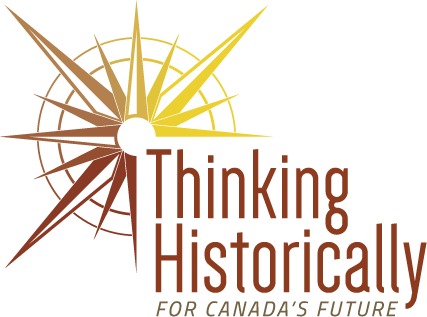Connecting Past, Present, and Future: Critical Reflections for Troubled Times
by Keeley Friar, PhD Student, Trent University
The History Education in Troubled Times workshop provided a meaningful opportunity to learn from the authors in the forthcoming edited collection, enriching my reflections on the critical nature of history education that challenges, engages, and embraces the processes of how we come to know. Within this edited collection, I am co-authoring a chapter with Sara Karn and Jackson Pind titled “Teaching histories of Indigenous women, girls, and 2SLGBTQQIA people: A relational approach to historical empathy.” On the first day of the workshop, we heard from the other authors and engaged in discussion about many themes, including reflexivity in history education and how Indigenous ways of knowing can inform our approaches and goals.
One theme has sparked additional reflection for me: the interweaving and interconnectedness of past, present, and future as foundational to better understanding and enacting history education. Through my background in Indigenous education and as a member of Hiawatha First Nation, I am drawn to this work on how Indigenous perspectives and ways of knowing are critical for all engagement in learning within history education and beyond. Hearing and considering these reflections, I felt inspired by the ways in which we can conceptualize and actualize learning about history in holistic, multifaceted ways.
Discussions about curriculum throughout the workshop have led me to further reflect upon the presence of and potential for this theme of the interconnectivity of past, present, and future within history education in Ontario, specifically. In the Canadian and World Studies curriculum, the Ontario Ministry of Education (2018) describes how history education “appeals to our love of stories. Through the narrative of history, we learn about the people, events, emotions, struggles, and challenges that produced the present and that will shape the future” (p. 103). With a goal of learning about history outside of a solely linear format, stories invite us to consider how we are implicated today as we build connections with the experiences of those who came before us. This learning demonstrates why these connections between past, present, and future are critical to history education. When faced with troubled times, a focus on past, present, and future through story and narrative allows us to engage with foundations of relationality and connectivity.
Additionally, the Ontario curriculum suggests that “The inclusion of current events in Canadian and world studies will help keep the curriculum a relevant, living document” (p. 40). The Calls for Justice from the Final Report of the National Inquiry into Missing and Murdered Indigenous Women and Girls (2019) highlight the importance of learning from both historical and contemporary contexts. A consideration of what and whose stories have been told about the land is critical for engagement with our histories, present day lives, and futures. This consideration brings forth critical conversations about implications for educators, another common theme from the workshop and within the edited collection. From the workshop, I am reflecting upon the value and possibilities of teachers as co-learners in these endeavours. The discussions have also caused me to reflect upon histories as living, including the histories of ourselves, those around us, and the land. This focus on learning from one another and the land is, thus, critical for history education.
The discussions from the workshop, including the theme of past, present, and future, carry forward into further critical reflections that have enhanced my perspectives as an educator and graduate student. These understandings are valuable for engaging students in history education and highlighting connections to our present-day lives, including pressing conversations about Truth and Reconciliation and how we can live in reciprocal relationships with the land. Our discussion of the project “To Honour and Respect: Gifts from the Michi Saagiig Women to the Prince of Wales, 1860,” within our chapter and at the workshop, highlighted the importance of engaging with the stories and work of Indigenous women within history education. The opportunity to engage with ideas around history education that highlight the voices of Indigenous peoples is a crucial part of this work.

Virtual Participants at the Workshop (Photo by Kristina R. Llewellyn).
My experiences with the History Education in Troubled Times workshop, as well as co-authoring a chapter about teaching histories of Indigenous women, girls, and 2SLGBTQQIA people for this edited collection, have been enriching in my appreciation of the roles and responsibilities of history education. The ideas shared canfoster meaningful engagement for educators and all those implicated in history education that addresses the times of today with a critical examination and meaningful consideration of the past.
Keeley Friar is a PhD student in the Chanie Wenjack School for Indigenous Studies at Trent University. She is a graduate of Trent University’s Master of Education and Indigenous Bachelor of Education programs and is certified by the Ontario College of Teachers. Keeley is a member of Hiawatha First Nation.
